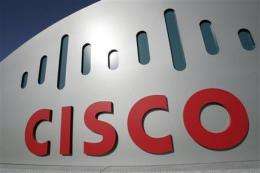In this Feb. 3, 2009 file photo, a Cisco Systems sign is shown at Cisco Systems headquarters in San Jose, Calif. Cisco, the world's largest maker of computer-networking gear, said Tuesday, Sept. 14, 2010, it plans to start paying a dividend before the end of its current fiscal year, in July. (AP Photo/Paul Sakuma, file)
(AP) -- Cisco Systems Inc., the world's largest maker of computer-networking gear, said Tuesday that it would pay its first dividend by July, the end of its current fiscal year.
Like several other big technology companies, Cisco has a large cash balance, and analysts have speculated that it would use it for a dividend.
Cisco CEO John Chambers said the annual dividend yield would be in the 1 percent to 2 percent range. The exact amount will be determined in the coming months while the company considers developments on the tax front and broader market conditions. Speaking at a conference for analysts and investors, Chief Financial Officer Frank Calderoni said the yield would be "competitive."
Cisco shares rose 26 cents, or 1.2 percent, to $21.52 in afternoon trading.
Technology companies usually prefer to invest their cash in themselves rather than return it to shareholders. In February, Apple Inc. CEO Steve Jobs told shareholders that he wanted to keep the company's $25 billion cash balance, which he said provides "tremendous security and flexibility." Dell Inc. and eBay Inc. are other holdouts.
However, once they reach the top of the industry, even technology companies find it hard to avoid paying dividend. Investors usually argue that the money is better spent on them than chasing further growth. Microsoft Corp. introduced a dividend in 2003 and now pays a 2.1 percent annual yield. Hewlett-Packard Co., which competes with Cisco in many fields, pays 0.8 percent.
Cisco, which is based in San Jose, Calif., had $40 billion in cash on July 31. However, $33 billion of that sits at overseas subsidiaries. Like other big exporters, Cisco has been reluctant to bring the money back to the U.S., to be taxed at the 35 percent corporate rate.
Because it needs some of its U.S. cash for other corporate needs, there's a possibility Cisco may have to tap its overseas hoard to pay a dividend.
Many companies took advantage of a tax amnesty for repatriating cash in 2004, and some have been pushing for a repeat of what was supposed to be a one-time event. Calderoni said that developments in repatriation rules would affect the size of the dividend.
Analyst Brian White at Ticonderoga Securities said the indicated dividend range, which works out to about $1.2 billion to $2.4 billion a year, wouldn't be "overly burdensome on the company's domestic cash balance." At the same time, it will likely widen Cisco's investor base, he said.
Cisco also indicated that taxes on dividends would also be a factor. A Bush-era tax cut is set to expire this year.
Cisco has been returning cash to shareholders through buybacks, amounting to $65 billion to 2010. Calderoni said the company is committed to continue doing buybacks and will continue to invest in research and design and purchase other companies.
©2010 The Associated Press. All rights reserved. This material may not be published, broadcast, rewritten or redistributed.




















